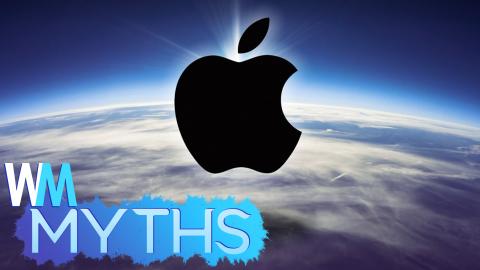Top 5 Myths About Apple - DEBUNKED!

With name recognition and market saturation usually comes… a tendency to exaggerate - be it for better or worse. Welcome to WatchMojo's Top 5 Myths. In today's instalment we're counting down the top five myths about Apple that are rotten to the core.
Top 5 Myths About Apple
With name recognition and market saturation usually comes… a tendency to exaggerate - be it for better or worse. Welcome to WatchMojo’s Top 5 Myths. In today’s instalment we’re counting down the top five myths about Apple that are rotten to the core.
#5: Apple Products Work Best With Apple Accessories
If there’s one thing that Apple loves to push… its their line of accessories. Their bid for technological global domination involves not just selling clients an Apple product, but the entire “Apple experience”. And by making sure that every single accessory, from cables to headphones, looks and feels beautiful - it’s a compelling pitch. In many cases, they use proprietary technology to impede the development of third-party peripherals, forcing consumers to keep it “in the family”. From an aesthetic standpoint, a purely Apple electronic home is sure to please, but it can be hard on the wallet. For a number of accessories, more affordable alternatives are available that can meet your needs and deliver a performance on par, if not better, than the more costly apple-made option.
#4: The iPhone Is The Most Popular Cell Phone
There’s no denying it… the iPhone has greater name recognition than any other phone in history. But its popularity in the media and cultural impact has resulted in an inflated image of market shares. Not everyone has an iPhone, even though that may often feel like the case. To be fair, the iPhone 6s was legitimately the best-selling smartphone of 2016. But Apple still only accounted for 14.6% of the total market, with various Android phones taking 80%. And while the iPhone 6 and 6s sold a combined 180+ million units, they don’t come anywhere near the best-selling cell phones in history - the Nokia 1100 and 1110, which each sold a whopping 250 million units in the early to mid-2000s. The iPhone 7… has had particularly weak sales.
#3: Apple Invented “Apps”
When you hear the word “app”, you most likely think of an iPhone or iPad - because Apple inc. played a major role in popularizing the concept. Despite major competition from Google Play, which, as of 2016, boasts a higher total number of available apps and greater number of downloads, the Apple App Store remains the most recognizable and lucrative app store around. However... they did not invent “apps” or the concept of an “app store”, despite making that very claim in a 2013 court case, when they attempted to block Amazon from using the term “app store”. The abbreviation “app” (for “application”) may owe its popularity to Apple, but mobile applications and centralised “app” distribution software have been around long before Apple adopted the concept.
#2: It’s Illegal to “Jailbreak” An iPhone
Think of Apple less as a legal authority figure and more as a parental one. They aren’t mad at you for jailbreaking… they’re just very, very disappointed. The term “jailbreaking”, alongside other criminally-inspired terms like “piracy”, certainly suggests illegal activity. But unlike pirating software, music or movies, jailbreaking an iPhone is legal. Under the Digital Millennium Copyright Act, it was illegal, but in 2012, the Library of Congress officially legalised the jailbreaking of smartphones, a ruling it extended to iPads, smart tvs, smartwatches and more in 2015. Regardless of the legal status, Apple doesn’t want consumers jailbreaking their devices because it allows you to download unauthorized apps and features, which means… they lose money. It’ll also void your warranty and... isn’t for everyone.
#1: Macs Can’t Get Viruses
If there’s one larger than life, unicorn-type myth that has been used to sell Apple computers to the technologically-challenged among us, it’s this bit of misinformation - “they don’t get viruses”... Wrong! In the early days of Mac computers, this was... less wrong, but not necessarily as a result of superior design. Macs were simply less common, and so, there was less motivation to develop Mac-specific viruses or malware. A virus is intended to spread... and as the strong majority, Windows-based PCs were thus the ideal demographic to attack. But as Macs have grown more popular, so too has the development of Mac-specific viruses. Macs are still better off, but users shouldn’t consider themselves immune - trojan horses, phishing scams and third-party plug-ins are distinct possibilities with potentially serious repercussions.
Had you previously considered any of these myths to be fact? Are you a Mac or a PC, and why? For more future-friendly top 10s and tech-related Top 5s, be sure to subscribe to WatchMojo.com.
Sign in
to access this feature